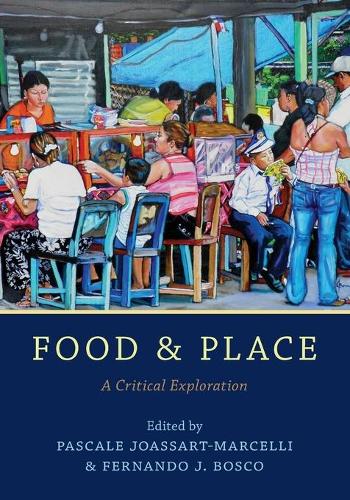
Food and Place: A Critical Exploration
(Paperback)
Available Formats
Publishing Details
Food and Place: A Critical Exploration
By (Author) Pascale Joassart-Marcelli
Edited by Fernando J. Bosco
Bloomsbury Publishing PLC
Rowman & Littlefield Publishers
22nd December 2017
United States
Classifications
Tertiary Education
Non Fiction
Social and cultural anthropology
Human geography
Cultural studies: food and society
394.12
Physical Properties
Paperback
366
Width 177mm, Height 252mm, Spine 23mm
780g
Description
This text provides a comprehensive and critical exploration of food from the unique perspective of place. It shows that our experiences with food are deeply influenced by their cultural, social, economic, and political contexts. The authors explore a wide range of questions such as: Do GMOs threaten rural livelihoods Why dont we eat dogs Does your neighborhood make you fat Do community gardens encourage urban gentrification Can cheese save a local economy Why are gourmet burgers appearing on menus all over the world How do immigrants use food to create a sense of place Does mainstream nutrition stigmatize bodies Is the kitchen an oppressive place Can celebrity chefs change the food system Critically engaged and connected to current activist and academic debates, Food and Place will be an essential resource for students across the social sciences.
Reviews
This is not a dry weighty compendium intended to be memorized and regurgitated at exam time. It is provocative and engaging reading offering fresh perspectives on the food challenges encountered in everyday life today.... Most engaging are the food for thought segments between chapters, which allow the reader to digest the material through reflection, activities, and recipes intended to get the reader out in the community as a participant-observer or in the kitchen as a critically aware cook.... In sum, Food and Place: A Critical Exploration is not only a fascinating college textbook, which, in this case, is not an oxymoron. But also it will resonate with the general public interested in provocative contemporary questions such as: Why dont we eat dogs Does your neighborhood make you fat Do community gardens encourage urban gentrification Can cheese save a local economy Is the kitchen an oppressive place * New York Journal of Books *
This exciting and expansive book convincingly argues that place is an essential lens through which to view all aspects of the food system, from bodies to landscapes to global economic flows. It is essential reading for scholars, students, activists, and policy makers working to create a more just and sustainable food system. -- Alison Alkon, Associate Professor of Sociology, University of the Pacific
Across the globe, how are food practices, from production toconsumption, shaped by the spaces in which they occur, and in turn, how do they transformplaces andcontribute to place-makingThisthoroughly engaging criticalanalysis takes us from GMOs to gentrification and from bio-politics to bodypolitics, making it a must read for activists and academics alike. -- Julian Agyeman, Tufts University
Offering students lucid explanations of key concepts, this collection is an excellent introduction to todays food and farming issues. Drawing on the latest research from multiple disciplines, the authors cover the central debates in areas such as ethical eating, social policy, and food politics. Students will come away with a deeper understanding of the spatiality of food practices, the ways food makes place, and how relations of powerrace, gender, classalways shape these geographies. -- Rachel Slocum, SIT Graduate Institute
Food systems are as dynamic as the global economy they have developed within. Because of this, we require vigilant and far-reaching analyses of the changes within food systems and how, in turn, these place-based changes disrupt peoples lives.This excellent book, including some of today's most important scholars of food and place, does just this. -- Nik Heynen, University of Georgia
Food and Place is a powerful collection of essays that explores the intimate relationships between what we eat and where we liveand how those relationships shape individual and geographic identities. Joassart-Marcelli and Bosco link global industrial food regimes to the landscapes they produce and the cultural meanings inherent in the food people ultimately consume. Their through-line is justice: for immigrant pickers and slaughterhouse workers, for urban communities facing food insecurity, and for diverse individuals confronting exclusionary food cultures. This is an important book for anyone interested in the critical role of food in our lives, livelihoods, and environments. -- Jennifer Wolch, University of California, Berkeley
Author Bio
Pascale Joassart-Marcelli is professor of geography at and director of the Urban Studies Program at San Diego State University. Fernando Bosco is professor of geography and graduate advisor for the doctoral program in geography at San Diego State University.
